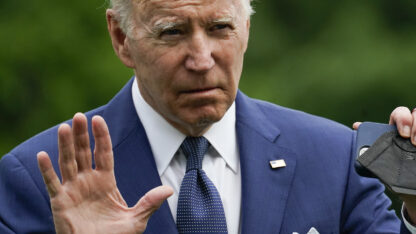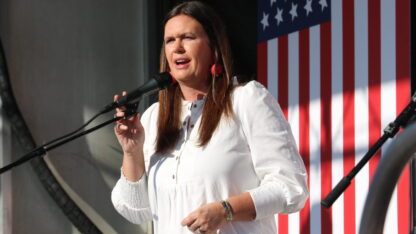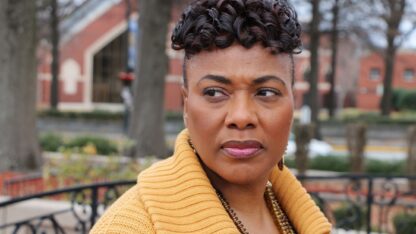After summonses went out to 1,000 people and attorneys questioned potential jurors for more than two weeks, a panel has finally been selected in the trial of the three men facing murder charges for the killing of Ahmaud Arbery.
But the racial makeup of the jury has been stirring controversy since it was finalized on Wednesday: Only one juror is Black, while the other 11 are white.
The Arbery case became a focal point in the national conversation around race last year after cellphone video emerged showing the three white defendants — Gregory McMichael; his son, Travis McMichael; and their neighbor William Bryan — chasing Arbery, a Black man, as he jogged down a residential street before one of them shoots him with a shotgun.
Over the course of jury selection, prosecutors in Georgia objected to defense attorneys as they repeatedly moved to strike potential Black jurors from the trial, calling it unconstitutional. And while Judge Timothy Walmsley acknowledged “intentional discrimination in the panel,” he told the court he was unable to reinstate any jurors who had been dismissed, saying the defense made race-neutral arguments for tossing them.
“They have been able to explain to the court why besides race those individuals were struck from the panel,” Walmsley said.
With opening statements in the trial set to begin as early as Friday, criminal justice advocates, legal experts and other observers of the case are voicing concern about how the lack of diversity on the jury could affect the outcome of the trial.
“There is a long and ugly history of excluding Black people from juries, particularly in the South, and we have just not figured out a way to escape this legacy,” Adam Benforado, a law professor at Drexel University, told NPR via email.
“In a case that seems to have so much to do with race, how can it be acceptable to have a jury with only one Black person on it, particularly in a county with a large African-American population? Well, in my opinion the answer is that it’s not, but our legal system has not provided tools that adequately address the problem.”
Diverse juries produce different trial outcomes
The Sixth Amendment of the Constitution guarantees citizens the right to a criminal trial by an impartial jury, but there’s no requirement that the jury be as racially diverse as the area where the trial is taking place.
Legal experts say that this can lead to imbalances. In Glynn County, where Arbery was killed and the trial is happening, nearly 27% of the population is Black.
Research suggests that juries made up of all-white members are more likely to convict Black people at higher rates.
A Duke University-led study of a decade of criminal convictions in Florida, for example, found that all-white jury pools convicted Black defendants 16% more often than white defendants. But when even just one Black person was added to the jury pool, the gap in conviction rates nearly disappeared.
Angie Setzer, a senior attorney for the Equal Justice Initiative, told NPR that diverse juries are more likely to discuss ideas that an all-white jury might overlook, such as racial profiling.
“Studies have shown that racially representative juries engage in a more thoughtful and deliberative fact-finding process,” Setzer said. “Studies have shown that racially representative juries are also better able to assess the reliability and credibility of witness testimony.”
The jury in the recent criminal case against Derek Chauvin, the former Minneapolis police officer who killed George Floyd, was even more racially diverse than the county where the trial took place. Chauvin was convicted and sentenced to 22 1/2 years in prison.
There are myriad obstacles to diversity on juries
Despite the research, Black people and other people of color remain less likely to end up in the jury box. The reasons for that start long before a trial even begins, legal experts say.
Each jurisdiction identifies potential jurors differently. In many places, courts issue summonses using driver’s license lists or voter rolls. But Black people are often missing from those rolls due to barriers they can face in registering to vote. If they live in a city where they rely on public transportation, they may not have a driver’s license. For those who cannot afford to miss work, the prospect of losing a paycheck is another obstacle to serving on a jury.
Every U.S. state besides Arizona also gives attorneys “peremptory challenges,” which they can use to strike potential jurors for basically any reason other than the person’s race or gender. Experts say peremptory challenges are another way to exclude certain groups of people, and it isn’t difficult for attorneys to find a race-neutral argument for using such a strike.
“The standard is so easy to articulate some kind of race-neutral reason that it’s very difficult for the judge,” Suja Thomas, a law professor at the University of Illinois at Urbana-Champaign, told NPR.
In the trial of the three men accused in the death of Arbery, prosecutors argued that the defense attorneys’ peremptory strikes were race based. The defense attorneys argued that they struck some potential Black jurors not because of their race but rather because they had expressed support for Arbery in the past or had made up their minds about the case, according to The Washington Post.
The practice is far from limited to defense attorneys, though. Thomas said it’s typically prosecutors who try to dismiss, for example, Black jurors from cases involving a Black defendant.
A 2010 report by the nonprofit Equal Justice Initiative found that the exclusion of people of color from criminal juries was “widespread” across the United States.
Setzer said juries that aren’t racially diverse can undermine the public’s confidence about the fairness of a trial.
“That is fundamentally what the jury system is about, what our criminal legal system is about. It’s about citizens’ confidence in it,” she said.
Copyright 2021 NPR. To see more, visit https://www.npr.org.
For a deeper exploration of Ahmaud Arbery’s story, listen to WABE’s podcast, “Buried Truths.” Hosted by journalist, professor, and Pulitzer-prize-winning author Hank Klibanoff, season three of “Buried Truths” explores the Arbery murder and its direct ties to racially motivated murders of the past in Georgia.9(MDAxODM0MDY4MDEyMTY4NDA3MzI3YjkzMw004))

9(MDAxODM0MDY4MDEyMTY4NDA3MzI3YjkzMw004))








